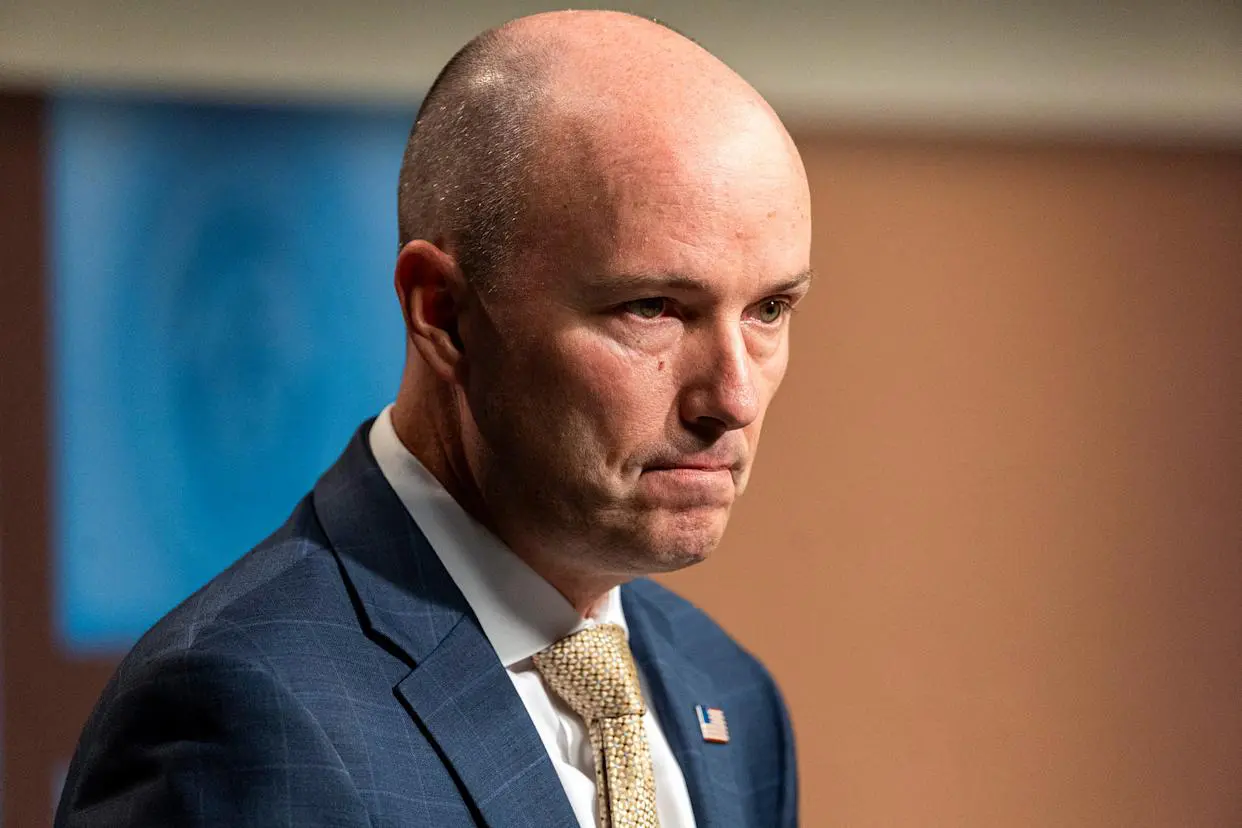Governor Spencer Cox Allows Controversial Bill to Pass Without His Signature Amid Growing Backlash
In a landmark and highly controversial move, Utah has become the first state in the United States to officially ban the display of LGBTQ+ pride flags in public schools and government buildings.
This comes after Governor Spencer Cox declined to veto or sign a bill passed by the Republican-majority state legislature, allowing it to become law by default. The decision has ignited nationwide debates over free speech, inclusion, and the role of politics in public spaces.
The law, which is set to take effect on May 7, 2025, has drawn mixed reactions—with conservative supporters praising it as a measure to maintain neutrality in public institutions, while LGBTQ+ rights groups and civil liberties organizations have condemned it as discriminatory and harmful to marginalized communities.
How Did This Law Come About?
The legislation was spearheaded by Republican state Rep. Trevor Lee, who argued that public schools and government offices should be free of politically charged symbols.
Although the bill does not explicitly single out LGBTQ+ pride flags, it bans any “unauthorized” flags from being displayed in public institutions, a move widely understood to target the LGBTQ+ community.
✔️ What the Bill Prohibits: The law prevents schools, government offices, and other taxpayer-funded institutions from flying any flags that are not officially sanctioned by state or federal government authorities.
✔️ What This Means in Practice: While flags like the U.S. national flag, state flags, and the POW/MIA flag are still allowed, the law effectively bans pride flags, Black Lives Matter banners, and other advocacy-related symbols from being displayed on government property.
✔️ Why Some Support the Law: Proponents claim that public institutions should remain neutral and that allowing certain advocacy flags while banning others could create divisiveness in schools and workplaces.
However, opponents argue that the bill disproportionately targets LGBTQ+ symbols, particularly the rainbow pride flag, which has been a symbol of support for LGBTQ+ youth and employees in schools, workplaces, and government offices.
Governor Cox’s Statement: Trying to Find Middle Ground?
Despite his refusal to veto the bill, Governor Spencer Cox sought to reassure LGBTQ+ Utahns, acknowledging the impact of the decision.
In a letter to legislative leaders, Cox attempted to strike a balance, stating:
“To our LGBTQ+ community, I know that recent legislation has been difficult. Politics can be a bit of a blood sport at times, and I know we’ve had our disagreements. I want you to know that I love and appreciate you, and I am grateful that you are part of our state. I know these words may ring hollow to many of you, but please know that I mean them sincerely.”
His statement, however, did little to ease concerns among LGBTQ+ advocates, who accused the governor of appeasing right-wing lawmakers at the expense of inclusion and free speech.
Why Is This Law So Controversial?
Many critics argue that this bill disguises discrimination under the pretense of neutrality.
Key concerns raised by LGBTQ+ activists and legal experts include:
🛑 1. Targeting LGBTQ+ Representation
While the law does not explicitly mention LGBTQ+ symbols, many believe that its true purpose is to ban pride flags. Since these flags have been widely used to show support for LGBTQ+ students and employees, the law could make schools and workplaces feel less welcoming.
⚖️ 2. Potential Legal Challenges
Several civil rights organizations, including the American Civil Liberties Union (ACLU), have hinted that lawsuits may be filed to challenge the constitutionality of the ban. Opponents argue that the bill could violate First Amendment rights by restricting free expression in public spaces.
📉 3. Harmful Message to LGBTQ+ Youth
Educators and psychologists have warned that the law could negatively impact LGBTQ+ students, particularly in conservative areas where they already face discrimination.
According to Dr. Lisa Monroe, a child psychologist specializing in LGBTQ+ mental health:
“The pride flag is more than just a symbol; it represents safety, inclusion, and affirmation for many young people who feel isolated or at risk. Removing it from schools could send a harmful message that their identities are not valued.”
🔥 4. Could Other States Follow Utah’s Lead?
Many fear that Utah’s decision could set a precedent for other conservative-led states, potentially leading to a wave of similar legislation across the U.S.
Already, lawmakers in Florida, Texas, and Tennessee have expressed interest in introducing their own versions of the bill, raising concerns about a nationwide rollback of LGBTQ+ visibility in public institutions.
Sundance Film Festival Moves Out of Utah: A Related Decision?
Utah’s growing reputation for restrictive social policies has already had real-world consequences, with major organizations reconsidering their presence in the state.
Just hours before Governor Cox’s decision on the flag ban, the Sundance Film Festival announced that it was relocating from Park City, Utah, to Boulder, Colorado, after four decades in the state.
✔️ While the festival’s organizers did not cite the flag ban specifically, many believe that Utah’s increasingly conservative laws on LGBTQ+ rights and social issues contributed to their decision.
✔️ The economic impact is significant, as Sundance has been one of Utah’s biggest cultural and tourism events, generating millions of dollars in revenue each year.
✔️ Colorado’s more progressive stance on LGBTQ+ rights made it an attractive new home for the festival, which has historically been inclusive and supportive of marginalized voices in film.
This move underscores the potential economic risks Utah faces as it implements more restrictive social policies.
What Happens Next?
With the law set to take effect on May 7, 2025, many questions remain:
🔹 Will legal challenges succeed in overturning the ban?
🔹 How will Utah enforce the law, and what consequences will schools and offices face for non-compliance?
🔹 Will other states follow Utah’s lead in banning LGBTQ+ pride flags?
🔹 Could businesses, festivals, or organizations leave Utah in protest, following Sundance’s example?
For now, Utah has placed itself at the center of a national debate—one that will likely shape discussions on LGBTQ+ rights, free speech, and political neutrality in public institutions for years to come.
Read also: Tragedy in Delta: Speeding Petrol Tanker Kills Mother and Child, Injures Others
Key Takeaways:
✔️ Utah is the first U.S. state to officially ban LGBTQ+ pride flags in schools and government buildings.
✔️ Governor Spencer Cox allowed the law to pass without his signature but acknowledged concerns from the LGBTQ+ community.
✔️ The bill, backed by Republican lawmakers, claims to promote neutrality but has been widely criticized as targeting LGBTQ+ representation.
✔️ Legal challenges are expected, with opponents arguing that the law violates free speech rights.
✔️ The Sundance Film Festival is relocating from Utah to Colorado, adding to the controversy.
















Got a Questions?
Find us on Socials or Contact us and we’ll get back to you as soon as possible.